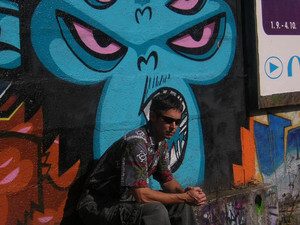
What is the function of language? Before you answer, think on it for a while. What if you had to boil it down to a single thing . . . the main, core, central function of language? If you were a monkey, probably the best answer would be that ‘language’ is a means of communication, a way to alert others to predators, food, a way of scaring off rivals and a way of ministering to mates and offspring.
But we are humans, and for us there are things that may be even more important than exchanging information permitting us to get along better in this world. When I think back on one my first linguistics professors at the University of Wisconsin, just to pick someone out at random, I can tell you the big topics we discussed—phonology, phonetic transcription, intonation, sound rules, and accent—but I can’t remember a single specific piece of information, even though I learned a lot, went on to write a monograph on a topic in phonology, and continue to work to this day on issues in this regard. However, what I remember specifically is the way the instructor said my name: it was /mua:k/ rather than /mark/; I remember that he would aspirate the /t/ in a word like “insert” when he would be describing, for example a phonological phenomenon where speakers sometimes add an extra sound (for example “somepthing” rather than “something”). I remember him using expressions like “that is to say . . .” and “let us posit . . .” and “therefore we may hypothesize . . .”). In short the specifics about my recollection of his language left the impression of a man that grew up in New York City, using a so-called ‘r-less’ dialect associated with the urban NYC working class, that had somehow found his way to Wisconsin, but who was not at all ashamed of his roots. In fact, he had an expansive personality and an eloquence that revealed his self-confidence, and a rather formal way of conducting himself with his students, that bespoke of social place, hierarchy, the seriousness with which he considered his subject matter, and which accentuated the social distance between himself and his students. All of which is to say that what I remember about this man is his sense of his social identity in relation to those around him, and not a dog-gone thing that he had to say.
Perhaps it is not too odd to think of the selectivity of memory as a tool for telling us what is truly fundamental to human language: let us think of human language as the means by which we project who we are in the larger social arrangements in which we form a part. Just like we wear certain clothes and hair styles to communicate who we are, even more so we use language to do the same, and it is through the linguistic choices that we make that we advertise our sense of our gender, age, social class, ethnicity, regional affiliations, educational level, comfort level, sense of self, sense of closeness to others, and so on.
The linguist Noam Chomsky has famously said that all humans speak one language, something that to any nonhuman would be as obvious as the fact to us that all adult emperor penguins look alike. Chomsky and others involved in exploring what has been called ‘Universal Language’ have proven how extensive and intricate the human language ‘biological endowment’ really is. For the sake of argument, let us say that all languages are 99% alike. Still, we humans, like emperor penguins, are naturally interested in the differences–differences that follow from decisions that we choose to make. And this is the scope and mission of ‘sociolinguistics: the study of those aspects of human language which are the result of human choice, guided by a metaphysical commitment to agency manifesting free will.
